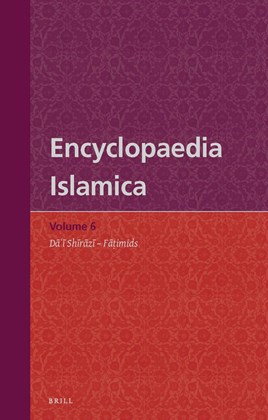Encyclopaedia Islamica, Volume 6 Dāʿī Shīrāzī – Fāṭimids
Brill in association with the Institute of Ismaili Studies
This volume of Encyclopaedia Islamica is the sixth of a projected 16-volume set, largely consisting of an abridged and edited translation of the Persian Dāʾirat al-Maʿārif-i Buzurg-i Islāmī, one of the most comprehensive sources on Islam and the Muslim world, to which a number of original articles, written specifically for the English edition, have been added. One of the unique features of this work of reference lies in the attention it gives to Shiʿi Islam and its rich and diverse heritage, which makes it complementary to other encyclopaedias. In addition to providing entries on important themes, subjects and personages in Islam generally, it offers the Western reader an opportunity to appreciate the various dimensions of Shiʿi Islam, the Persian contributions to Islamic civilisation, and the spiritual dimensions of the Islamic tradition.
This volume contains biographical articles on a number of major Muslim scholars such as the great philosopher and polymath, Abū Naṣr Muḥammad al-Fārābī, as well as the 9th/15th-century Persian philosopher, theologian and gnostic, Jalāl al-Dīn al-Dāwanī. It also includes historical surveys of important concepts in Islam, such as daʿwa and dīn, and of religious groups such as the Druze. In terms of the traditions of Sufism, there are articles on Dārā Shukūh, al-Dasūqī, Abū al-Ḥasan al-Daylamī and Dhū al-Nūn al-Miṣrī. Persian social and architectural history are discussed in articles such as dihqān and the Fahraj Congregational Mosque. The volume also includes entries of considerable importance for the study of Shiʿism, such as those on Fadak and the Fatimid dynasty, as well as a comprehensive article on Fāṭima, the wife of Imam ʿAlī and daughter of the Prophet Muḥammad, and as such revered by all Muslims, especially the Shiʿa Muslims.
The Encyclopaedia Islamica is available in print and at Brill Online.
Dāʿī Shīrāzī
Dāʾira, Daf
Dajjāl
Dakkanī, Shāh ʿAlī-Riḍā
Damascus
Damāwand
Daniel
Daqīqī, Abū Manṣūr
Dār al-Funūn
Dār al-Islām wa dār al-ḥarb
Dār al-Nadwa
Dārā Shukūh
Dārābnāmah
al-Dāraquṭnī
Darband
Darb-i Imām
al-Dārimī, Abū Muḥammad
al-Dārimī, Abū Saʿīd ʿUthmān
Darqāwiyya
Darwīsh (Dervish)
Darwīsh ʿAbd al-Majīd Ṭāliqānī
Darwīsh Khān
Dastgāh
al-Dasūqī
David (Dāwūd)
Daʿwa
Dawāmī, ʿAbd Allāh
al-Dawānī
Dawāzdah Imām
Dawr
al-Dawr wa al-tasalsul
Dāwūd al-Anṭākī
Dāwūd al-Ṭāʾī
Dāwūd b. al-Muḥabbar
Day
al-Daylamī, Abū al-Ḥasan
Dayn
Dayṣāniyya
Death
Deccan
Delhi
Delhi Sultanate
Dentistry
Dhawq
Dhū al-Nūn al-Miṣrī
Dihlawī Bukhārī, ʿAbd al-Ḥaqq
Dihqān
Dilshād Khātūn
Dīn
al-Dīnawarī, Abū Ḥanīfa
Dissection and Anatomy (Tashrīḥ)
Dīwān al-ʿArḍ
Diyār Bakr
Dizfūl, the Great Mosque of
Dream Interpretation
Druze
Dū Dar, Madrasa
Dualism
Duʿāʾ-niwīsī
Duhul
al-Dūryastī
Dūst Muḥammad Khān
Ecstasy
Elias/Elijah
Empedocles
Enoch (Idrīs)
Epic (ḥamāsa)
Erzerum
Eschatology
Ethics
Euclid
Eve
Evil eye
Fadak
Faḍl Allāh Ḥurūfī Astarābādī
al-Faḍl b. Shādhān
Fahraj Congregational Mosque
Fakhr al-Dīn ʿAbd al-Ṣamad Hamadānī
Fakhr al-Dīn ʿAlī Ṣafī
Falconry
Fanāʾ and Baqāʾ
al-Fanārī
Faqr
al-Fārābī
Farasnāmah
Farghāna
al-Farghānī
Farīghūnids (Āl-i Farīgh)
Fāṭima
Fāṭimids
‘Clearly the editors of ISLA have selected articles they consider will augment the existing reference sources – and they have completed this selection task with acumen and skill. The work as a whole remains, however, a “specialist encyclopaedia” [...] - or perhaps more accurately, it is an encyclopaedia for specialists [...]. In that sense, it is a valuable addition [...] to the reference work available at present. Perhaps its greatest merit is that it brings to an international audience a key example of and an excellent advertisement for high-quality Iranian scholarship which has hitherto been available but known only to a few.’
– Robert Gleave, Journal of the American Oriental Society
‘[The] publication of Encyclopaedia Islamica is a notable step forward in including the Shi‘a viewpoint in scholarship on Islam.’
– Mousa al-Reza Wahdati, Journal of Shi‘a Islamic Studies
‘Printed on coated paper, the five volumes so far published are an impressive achievement both in production as well as in scholarship related to Persian themes.’
– Yashab Tur, Islamic Sciences
Farhad Daftary is Associate Director of the Institute of Ismaili Studies. He is an authority on Mediaeval Islam and Ismaili studies, consulting Editor of Encyclopaedia Iranica, and sits on the Advisory Board of the Encyclopaedia of Islam (3rd edition).
Wilferd Madelung has made significant contributions to scholarship on mediaeval Islamic movements, including Twelver Shi‘ism, Zaydism and Ismailism. He is a former Laudian Professor of Arabic at the University of Oxford and Senior Research Fellow with The Institute of Ismaili Studies.

